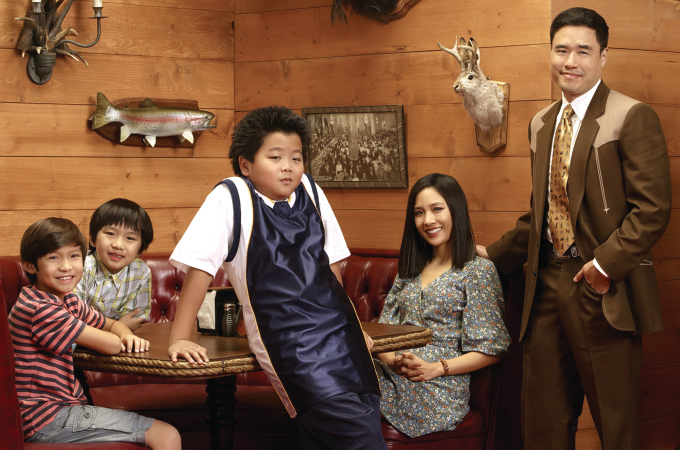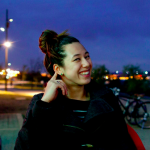
ABC’s “Fresh Off the Boat” as a step forward (and a misstep) for Asian-American representation on television (Photo: ABC).
To say I grew up without role models is an overstatement, but to say that I didn’t notice there weren’t many Asians on television when I was younger would be a lie. As an awkward half-Asian teenager living in suburban New York, I always kept an eye out for cool characters who looked even a little bit Asian, and would be totally disheartened when I realized the only Asian characters who made it on TV were either huge nerds or sex goddesses—not regular kids like me.
I’m no longer a teenager, and I’m only slightly less awkward, but I’m still on the lookout for complex Asian characters in roles that go beyond simple stereotypes and pretty faces. The good news is that I’m seeing progress: There are more television shows on the air these days with at least one Asian cast member and, sometimes, those characters even have a lead role, something that was once unimaginable to me. It’s a relatively poor showing overall. According to a study by Fusion in 2014, out of 800 actors on over 100 primetime scripted network TV shows, only 52 were of Asian descent.
But progress is still progress, and at the forefront of this movement is ABC’s Fresh Off The Boat, the first sitcom on broadcast television in over twenty years that stars an Asian family. And from the start, the show was placed under immense pressure by viewers and commentators to do Asian-Americans proud. Months before it premiered this past February, Fresh Off The Boat was being heralded as “TV history in the making,” an important cultural milestone for Asian-American culture writ large.
The show experienced huge pressure to live up to its cultural expectations—hardly assuaged by show creator Eddie Huang after he published an extensive essay in New York Magazine about how ABC tried to turn his story into a “universal, ambiguous, cornstarch story about Asian-Americans.” There was a collective sigh of relief when Fresh Off The Boat lived up to the hype, even getting renewed for a second season by the network. What might be more surprising is how this show is already paving the way for more shows with Asian families: Dr. Ken, starring Ken Jeong of NBC’s Community and The Hangover movies, will premiere on ABC this fall.
I celebrated the premiere of Fresh Off The Boat alongside others in the Asian-American community and was overjoyed to hear about its renewal. In many ways, this sitcom is exactly the show I’ve been looking for. (I’m also an unabashed Eddie Huang fangirl, which probably helped.) On its most basic level, the show’s Asian characters are portrayed by actual Asian actors; the Chinese spoken in the show is actually Chinese, and not some made-up oriental-sounding mumbo-jumbo.
It somehow feels revolutionary to watch network television show which features only Asian actors discussing everyday American problems, like how to get along with in-laws or how to save a struggling business. The episodes are funny and the characters complex; they express likes and dislikes that have nothing to do with their Asianness. The TV version of Eddie Huang (Hudson Yang) isn’t a huge nerd, loves hip-hop, and idolizes Shaquille O’Neal. His mother Jessica (Constance Wu) loves Stephen King and gets a curly success perm as a way to prove to her family’s prosperity to her sister. “I don’t know why, but to my people,” explains real-life Eddie Huang in the episode’s voiceover, “curls were like dollar signs.” When their ethnic heritage is brought up, the references are genuinely Taiwanese, such as Jessica’s fear of the number four.
But the same nuance that makes the show believable also makes it isolating, especially when the show is broadly discussed as a “win” for Asian-American culture. When Jessica freaks out about the number four, I, a fellow Asian-American woman, needed the superstition explained to me because I am Korean-American, not Taiwanese-American. I then feel guilty for needing a translation—like I am less of Asian-American for not getting the joke.
Ignoring ethnic differences isn’t wrong, but it doesn’t feel natural. I identify as Korean-American rather than as Asian-American, unless its a on a census form and I can’t get more specific. Rounding the story of a Taiwanese-American family up to the story of an Asian-American family feels akin to checking off that generic box, even though the show itself is more nuanced than this generalization makes it appear. I find myself trying to squeeze my Korean-American experience into a story about Taiwanese-Americans because we’re all Asian-Americans. Sometimes it works, but it usually ends in frustration.
Those feelings of frustration and isolation are only compounded by the show’s casting choices. Even though all the actors portraying members of the Huang family are Asian, not all are Taiwanese or even Chinese. The most notable substitution is Korean-American actor Randall Park, who plays the family’s patriarch Louis Huang. (You might remember Park from 2014’s The Interview, in which he plays a surprisingly vulnerable Kim Jong-Un.) In an interview with KoreAm, Park admitted that this disconnect between his own Korean-American experience and the character’s Taiwanese one made him uncomfortable; he almost backed out of the show because he thought the role should go to a Taiwanese actor.
“After the pilot got picked up, it all came into perspective for me, and it just didn’t feel right,” said Park. “Plus, the accents, and having to play an immigrant, even though I wasn’t one.” Park was convinced to stay on by the real-life Eddie Huang and even learned a bit of Mandarin to help hone a more realistic Taiwanese accent.
Seeing a Korean character portrayed by an actor of a different ethnicity is equally disorienting for me as a Korean-American viewer. I loved Gilmore Girls when I was younger, in no small part because the main character’s best friend was Lane Kim, the first explicitly Korean character I ever saw on television. I therefore assumed the actress who portrayed her was also Korean, only to learn much later that the actress playing Lane was Japanese-American. In retrospect, her name being Keiko Agena should have tipped me off. I felt wholly duped, wondering why a Korean woman wasn’t cast as a Korean character. I had felt so much kinship toward a fellow Korean, only to learn that she was only pretending. Did the casting directors not understand that Japanese people are different from Koreans?
It might seem like a petty squabble, but these ethnicity-bending casting choices only further the false belief that all Asians are the same: whether they’re from China, Japan, Vietnam, or Korea. My own desire for more specific portrayals of Asian-Americans stems from my tendency to get upset when others assume I’m Chinese—something that is not helped by my Korean grandparents’ fierce loyalty to their culture. Not all East Asians are Chinese, so in some ways, rounding these stories up to Asian-American feels like a step back.
For example, South Asian cultures are vastly different from East Asian ones, and at the same time, both are part of the Asian-American experience. Television executives would never conflate the Huangs and the Patels, however. If American media isn’t making that kind of leap, it forces the question as to why it is permissible to conflate Chinese, Japanese, and Korean cultures.
Generalization might be necessary in order to get more Asian faces on TV, but it has to be the first step as opposed to the end goal. As more Asian and Asian-American characters appear in the media, it’s important for viewers to remember the wealth of differences between varying Asian cultures. It is therefore unreasonable to expect that any one show can (or should) encapsulate the entirety of the Asian-American experience. But that’s exactly what viewers are asking Fresh Off The Boat to do, likely because there’s only one show on the air with an explicit focus on an Asian family.
But what makes Fresh Off The Boat work is that it stays relatively true to the experiences of one Taiwanese-American family, despite facing external pressure to speak for an entire immigrant experience. To keep making progress, the next show that comes along with an Asian or Asian-American lead (I’m looking at you, Dr. Ken) should offer the same kind of realistic portrayal for whichever ethnicity or culture is featured, rather than a convoluted amalgamation of Asian-American culture.
Once there are enough Asian and Asian-American faces and stories on-screen, the next step is to have an actor’s ethnicity match that of the character. I imagine a version of Fresh Off The Boat with a Taiwanese actor playing the role of the patriarch instead of a Korean-American one. I think it’s achievable, but it will require both a bigger pool of Asian actors from which to choose, and more diverse group of writers who can explore these different ethnic, yet all Asian, experiences. Asians make up the fastest growing minority group in the United States, so I anticipate the demand for funny, nuanced shows about the Asian-American experience to continue to grow, as the tolerance for orientalist and racist depictions of Asians in the media diminishes.
Until that level of nuance is reached, I’ll keep watching and supporting shows like Fresh Off The Boat because seeing more Asian-American faces on TV is the first step, and I don’t want any other awkward half-Asian teenagers to have to wonder where all the cool Asian-Americans are.
.
 Maxine Builder studied international relations at Tufts University, and then decided to use that degree to write about Korean fashion trends. When she’s not dreaming about what she’d look like with a lavender top-knot, Maxine’s writing and thinking about global health policy. A native New Yorker, Maxine lives in a renovated warehouse in Brooklyn.
Maxine Builder studied international relations at Tufts University, and then decided to use that degree to write about Korean fashion trends. When she’s not dreaming about what she’d look like with a lavender top-knot, Maxine’s writing and thinking about global health policy. A native New Yorker, Maxine lives in a renovated warehouse in Brooklyn.
